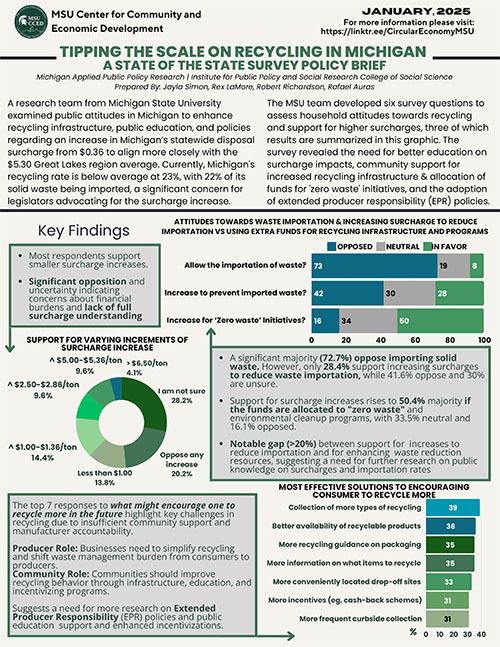News
Tipping The Scales on Recycling in Michigan
In the fall of 2023, select CEI Network partners, including CCED Director Dr. Rex LaMore, RA Jayla Simon, Ecological Economist at the White House Office of Management and Budget Dr. Robert Richardson, and Amcor Endowed Chair in Packaging Sustainability Dr. Rafael Auras, applied for the Michigan Applied Public Policy Research Grant to research Michigan’s recycling rates and policy issues, such as waste importation, household recycling behaviors, and the interplaying impact of statewide disposal surcharges and recycling infrastructure.
The team conducted a review of literature and baseline data to develop a conceptual framework for analyzing a specific meaningful policy issue. Key findings were that Michigan recycles only 18% of its waste, well below the national average, while importing over 22% of its trash due to low disposal fees, and faces landfill capacity issues with a tipping fee significantly lower than the regional average.
Subsequently, the team established and proposed various research questions aiming to understand Michigan households’ recycling behaviors, barriers to recycling, support for importing solid waste, and willingness to support higher disposal surcharges, as well as relevant implications on public policy.
After receiving the grant, the team conducted additional research, which suggested that to improve recycling rates, policies informed by citizen needs and prioritizing more comprehensive outreach are essential. In support of additional research, the team conducted secondary surveys and interviews with landfill operators and waste management industry experts, as well as reviewed past State of the State Survey (SOSS) surveys to identify gaps and patterns in research.
Informed by such research and analysis of past data, reports, and publications on recycling behaviors and barriers in Michigan, the team was able to develop six questions, purchased through grant funding, for the SOSS. These questions explored household attitudes towards recycling, importing solid waste, and support for increasing the statewide disposal surcharge for varying reasons.
The survey was distributed via email to respondents, who were asked to participate by clicking a link and answering the questions to the best of their ability. Following the distribution of survey questions, our team analyzed the raw data to conclude the following findings. The team identified the following key variables that they used to indicate themes of responses as well as conduct various cross tabulations regarding demographic characteristics: ‘attitude about recycling,’ ‘knowledge about recycling,’ ‘always recycle,’ ‘should recycle more,’ and ‘number of barriers.’ The data analysis also used the responses to categorize popular infrastructural changes to encourage recycling by categorizing responses into three groups: Individual, Corporate, and Public Infrastructure. Using SPSS, the team consolidated the options of the question asking about methods to encourage recycling and based on research and past survey data. Key findings from the top seven chosen options categorized accordingly included the need for better community support, more information from manufacturers, and increased public education.
Most interestingly, the survey revealed significant opposition to waste importation and mixed opinions on increasing disposal surcharges to fund recycling programs. For example, a discrepancy exists between the support for raising fees to reduce waste importation and the support for increasing recycling programs.
The analysis of such complexities has highlighted the importance of Extended Producer Responsibility (EPR) programs and the need for public education on the benefits of policy changes to enhance recycling rates and sustainable waste management practices.
That being said, sustainability and circularity influence every aspect of an individual’s life and the urgent need to change how the game is being played is evident in empirical evidence and the theme seen throughout the data collected from the MAPPR survey taken by various Michigan residents. There are revolutionary ways to modify Michigan’s current progression. Some suggestions that would revive recycling within communities are:
- Implementing regulations or incentives for businesses to design products with easier recycling in mind would shift the responsibility from consumers to producers
- Increasing outreach by public officials to educate communities about recycling systems can enhance understanding and support for sustainability initiatives, and encourage accountability in public and private sectors.
More specifically, the Policy Brief stated four distinct recommendations for the state of Michigan.
- Enhance Education on Surcharge Impacts: Provide more information on the impacts of surcharges and their potential uses, such as importation.
- Support Surcharge Increase for Recycling Infrastructure: Advocate for a surcharge increase to expand recycling infrastructure, making it more convenient and meaningful for consumers to recycle.
- Allocate Funds for ‘zero waste’ initiatives: Funds from a surcharge increase supported by consumers to be directed to ‘zero waste’ solutions can go towards research and efforts in advancing a Circular Economy, targeting policy and business action and relieving some of the burden from consumers and reducing waste streams in general.
- Increase Extended Producer Responsibility (EPR): Adopt extended producer policies and programs that reduce the use of single use products/materials that will reduce the overall waste stream, create economic opportunities for salvage and reuse enterprises and reduce the burden of recycling on consumers.
To decrease the importation of waste from other states and Canada, to decrease the amount of waste produced in the first place, to decrease the burden put on the consumers, and to decrease the uncertainty about recycling, it is crucial that the people of Michigan work together to create a culture that promotes sustainability through recycling—in doing so, creating a cleaner, more bright future for current and future generations.
State of the State Podcast


